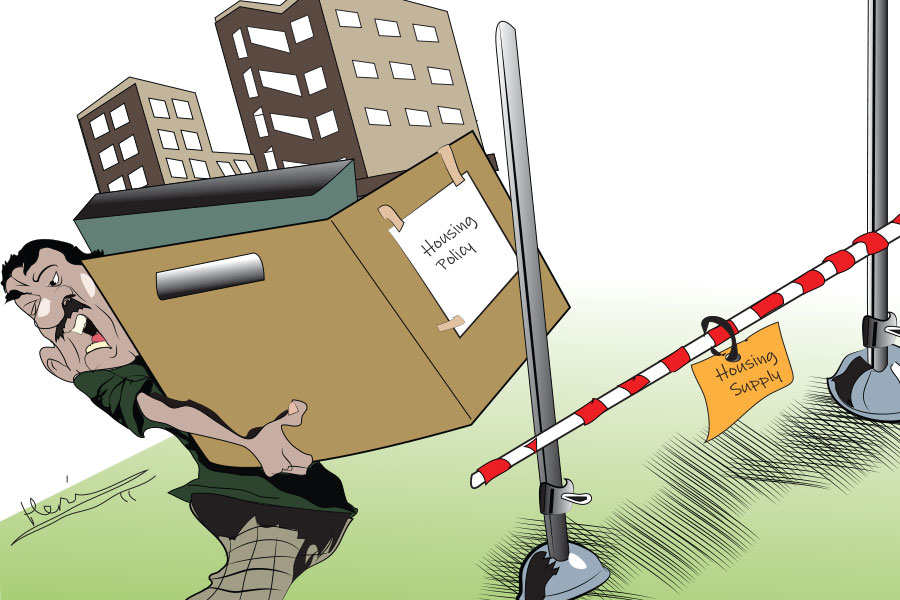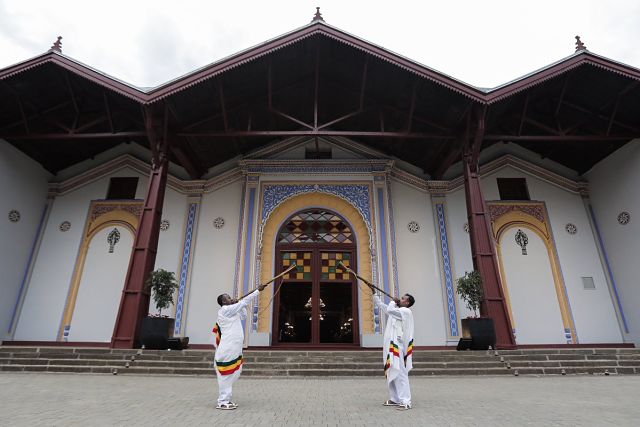
Aug 29 , 2020
By MAYA MISIKIR ( FORTUNE STAFF WRITER )
A total of 45 construction companies submitted bids for the construction of kitchen and dining halls across 151 schools in the city, a project estimated to cost 25.5 million dollars.
The Food Security & Productive Safety Net Agency is evaluating the technical and financial documents submitted by the companies for the construction of the facilities across the selected schools under the School Feeding Programme. Launched with the initiative of the former deputy mayor of the city, Takele Uma, the project is financed by the World Bank.
The construction of the facilities will be undertaken through a combined effort of the City's Construction Bureau, Education Bureau and the School Feeding Agency, which is overseeing and facilitating the entire programme.
Announced in early July, the bid for the construction job closed on August 17 and 18, 2020, and the evaluation process is expected to be finalised by September 7. Initially, the bid attracted the interest of 534 companies, 45 of which submitted their bidding documents.
A total of 12 construction companies will be selected for the facilities that will be built across nine districts.
The assessment of the companies in the initial stage was composed of four aspects including ascertaining a CPO, or a bid security, along with separate financial and technical documents. The total time allocated for both technical and financial evaluations, with a 14-day period for presenting and responding to grievances, is 45 days, after which winners of the bid will be announced.
The construction of the dining halls and kitchens is expected to take a total of four months to be completed. The selected 12 companies will be constructing one lot each, under which there are up to 20 schools. There are a total of 90 schools with the capacity to host 400 students and the remaining with a capacity to hold 200 students.
While the initial idea was to divide the nine construction companies to the corresponding nine districts in the city, it was later decided that allocating only 20 schools or less under one lot would be best for the ease of management and supervision, according to the Agency's deputy director, Tamrat Estifanos.
"This was also to ensure that we don't further limit the participating companies," he said. "One lot has already high requirements, and it would have eliminated further companies."
Bole District, with 20 schools under it, requires the construction company to have an annual turnover of 166 million Br.
The Agency formed three committees; an evaluation, a technical and an endorsing. The evaluation committee will be responsible for assessing the initial requirements along with the financial requirements, whereas the technical committee will appraise only the technical aspects of the bid.
The cost for the overall construction of kitchens and halls is allowed to be 20pc more than the budget, according to Tamrat.
"But this will mean fewer schools will be upgraded," he said.
Though the World Bank is financing the construction to a certain extent, the City Administration will cover the costs of the remaining 198 secondary schools in the programme once the bidding process has been finalised.
Based on the submissions that have been presented to the Agency thus far, only one submission has been presented for the Arada and Kirkos districts with 14 lots combined.
This will not entail cancellations of the bid, according to Tamrat.
"The Agency has the mandate to decide under the evaluation committee," he said. "There will be assessments done to ascertain that the cost is not exaggerated, and this will be determined by drawing a comparison with the market price."
Even in this case, where it is more than 20pc of the market price if it does not exceed the allotted budget, the company will be chosen in the interest of time and proceeding with the project, according to Tamrat.
The World Bank has allocated two consultants who are overseeing the process.
The huge gap in the number of companies that have bought the initial bid and those that finally submitted the documents indicates that the conditions of participation may have been too stringent, according to Dilnesahu Samuel, logistics and supply chain management unit head at the School of Commerce at Addis Abeba University.
"The conditions should be in place to ascertain that those not meeting the criteria won't be able to do the job," he said. "Otherwise, it will be screening the quality of the contractor."
Fairness, one of the five basic principles of the country's public procurement law, involves not demanding unnecessary details from the supplier, according to the expert.
"It should be well elaborated but not set up to hinder competitiveness," he said.
PUBLISHED ON
Aug 29,2020 [ VOL
21 , NO
1061]

Radar | Apr 06,2019

Editorial | May 04,2019

Radar | Feb 23,2019

Radar | Dec 12,2020

Viewpoints | Jul 02,2022

Fortune News | Oct 12,2019

Radar | Jan 21,2023

Radar | Feb 27,2021

Fortune News | Jun 15,2019

Fortune News | Sep 18,2022

Dec 22 , 2024 . By TIZITA SHEWAFERAW
Charged with transforming colossal state-owned enterprises into modern and competitiv...

Aug 18 , 2024 . By AKSAH ITALO
Although predictable Yonas Zerihun's job in the ride-hailing service is not immune to...

Jul 28 , 2024 . By TIZITA SHEWAFERAW
Unhabitual, perhaps too many, Samuel Gebreyohannes, 38, used to occasionally enjoy a couple of beers at breakfast. However, he recently swit...

Jul 13 , 2024 . By AKSAH ITALO
Investors who rely on tractors, trucks, and field vehicles for commuting, transporting commodities, and f...

Nov 1 , 2025
The National Bank of Ethiopia (NBE) issued a statement two weeks ago that appeared to...

Oct 25 , 2025
The regulatory machinery is on overdrive. In only two years, no fewer than 35 new pro...

Oct 18 , 2025
The political establishment, notably the ruling party and its top brass, has become p...

Oct 11 , 2025
Ladislas Farago, a roving Associated Press (AP) correspondent, arrived in Ethiopia in...